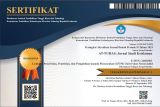Aisyah, S., Harahap, M. I., Nurbaiti, N., & Rokan, M. K. (2023). The Factors Influencing Behavioural Intention Fintech Lending (Paylater) Among Generation Z Indonesian Muslims and Islamic Consumption Ethics Views. EKONOMIKA SYARIAH : Journal of Economic Studies, 7(1), 01. https://doi.org/10.30983/es.v7i1.6233
Albra, S., Hadi, P., & Anwar, F. (2023). Halal awareness and purchase intention: The mediating role of religiosity. Journal of Consumer Behavior in Emerging Markets, 5(1), 15–29.
Ashraf, M. (2019). Halal awareness and consumer behavior in Bangladesh. Journal of Islamic Marketing, 10(2), 567–582.
Bhutto, M. Y., Ertz, M., Soomro, Y. A., Khan, M. A. A., & Ali, W. (2023). Adoption of halal cosmetics: extending the theory of planned behavior with moderating role of halal literacy (evidence from Pakistan). Journal of Islamic Marketing, 14(6), 1488–1505. https://doi.org/10.1108/JIMA-09-2021-0295
Bonne, K., & Verbeke, W. (2008). Muslim consumer trust in halal meat status and control in Belgium. Meat Science, 79(1), 113–123. https://doi.org/10.1016/j.meatsci.2007.08.007
Endri, Y., Santoso, B., & Wibowo, R. (2020). Lifestyle influence on Generation Y consumer behavior in Indonesia. . Asian Journal of Business Research, 10(1), 1–16.
Hair, J. F., Black, W. C., Babin, B. J., & Anderson, R. E. (2010). Multivariate data analysis (7th ed.).
Hakim, L. (2023). An Empirical Study on The Influence of Purchase Intention on Muslim Fashion among Generation Z. Journal of Social and Management Sciences, 13(4), 36–49.
Harahap, M. I., Hasrimy, N. F., Ubay, F. A., & Nawrah, H. (2024). Use of Online Securities Apps in Generation Z. . Islamic Banking and Islamic Economic Journal, 3(1), 37–47.
Imsar, I., Nurhayati, N., Harahap, I., & Silalahi, P. R. (2024). The Impact Of The Halal Industry And Islamic Financial Assets On Indonesia’s Economic Growth Using The Vector Autoregression (Var) Approach. EKUITAS (Jurnal Ekonomi Dan Keuangan), 8(2), 274–287. https://doi.org/10.24034/j25485024.y2024.v8.i2.6299
Investopedia. (n.d.). (n.d.). Generation Z definition. .
Ismail, A. (2025). Social and religious factors influencing Generation Z halal consumption in the Middle East. . Journal of Middle Eastern Consumer Studies, 3(1), 55–71.
Ismail, I. J. (2025). Halal brand quality and halal food purchasing intention among university students: The moderating effect of customer-employee interactions. Social Sciences & Humanities Open, 11, 101352. https://doi.org/10.1016/j.ssaho.2025.101352
Kotler, P. , & K. K. L. (2022). Marketing management (16th ed.). Pearson.
Kotler, P., & Keller, K. L. (n.d.). Marketing management (14th ed.). Pearson Education Limited.
Kulviwat, S., Bruner, G. C., & Al-Shuridah, O. (2009). The role of social influence on adoption of high tech innovations: The moderating effect of public/private consumption. Journal of Business Research, 62(7), 706–712. https://doi.org/10.1016/j.jbusres.2007.04.014
Maslow, A. H. (1943). A theory of human motivation. Psychological Review, 50(4), 370–396. https://doi.org/10.1037/h0054346
Ngah, A. H., Ramayah, T., Iranmanesh, M., & Zailani, S. (2023). Editorial: Halal production, services, consumption, and consumer behavior. Frontiers in Psychology, 13. https://doi.org/10.3389/fpsyg.2022.1104099
Pradana, M., & Elisa, H. P. (2024). A bibliometric analysis of halal cosmetics consumer behaviour in Indonesia. JPPI (Jurnal Penelitian Pendidikan Indonesia), 10(2), 632. https://doi.org/10.29210/020242679
Purnasari, N., Puji Astuti, S., & Rusdan, I. H. (2023). Gen Z’s Knowledge of Halal Foods and Products on Purchase Behaviour . Jurnal Dakwah Dan Manajemen Haji Indonesia, 6(2), 1–13.
Putera, A., Firdaus, R., & Nugroho, H. (2023). Bibliometric analysis of Muslim consumer behavior research. . Journal of Islamic Business and Management, 14(2), 77–93.
Putri, Y. C. (2025). The Impact of Halal Certification and Halal Awareness on Generation Z’s Purchase Intentions. . International Journal of Islamic Economics and Business, 6(2), 123–138.
Radianti, A., & Aslami, N. (2022). Analisis Faktor-Faktor Yang Mempengaruhi Perilaku Konsumen Dalam Memilih Produk Asuransi Syariah. Mimbar Kampus: Jurnal Pendidikan Dan Agama Islam, 21(2), 103–117. https://doi.org/10.47467/mk.v21i2.885
Rokhmah, F. N. (2025). Social Media Influencers on Halal Cosmetic Purchase Intention among Gen Z Muslims . Al-Iqtishad: Journal of Islamic Economics, 17(1), 45–60.
Shah Alam, S., & Mohamed Sayuti, N. (2011). Applying the Theory of Planned Behavior (TPB) in halal food purchasing. International Journal of Commerce and Management, 21(1), 8–20. https://doi.org/10.1108/10569211111111676
Soon, J. M., Chandia, M., & Regenstein, J. Mac. (2017). Halal integrity in the food supply chain. British Food Journal, 119(1), 39–51. https://doi.org/10.1108/BFJ-04-2016-0150
Van den Bulte, C., & Stremersch, S. (2004). Social Contagion and Income Heterogeneity in New Product Diffusion: A Meta-Analytic Test. Marketing Science, 23(4), 530–544. https://doi.org/10.1287/mksc.1040.0054
Wilson, R., & Liu, J. (2011). Islamic branding and halal consumption in Western markets. Journal of Islamic Marketing. Journal of Islamic Marketing, 2(2), 149–165.
Yüksel, A. (2022). The influence of social norms and religiosity on halal consumption among European youth. Journal of Consumer Policy , 45(4), 743–765.
YÜKSEL, S. (2022). Gen Z as Halal Consumers: Oman Scope. Academic Platform Journal of Halal Life Style. https://doi.org/10.53569/apjhls.1038904
 (UIN Sumatera Utara Medan)
(UIN Sumatera Utara Medan) 




.png)






